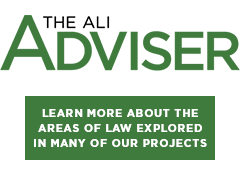Civil Liberties and COVID-19
The Federalist Society held a COVID-19 & the Law Conference which concluded with a panel on "Civil Liberties and COVID-19." The panel took place via teleconference on June 12, and featured ALI members Julia Mahoney of UVA Law and Eugene Volokh of UCLA Law. A video of the discussion is available here.
From the event description:
Various governmental and private measures relating to COVID-19 are raising challenging civil liberties questions both in the US and around the world. What are the limits on States and localities’ ability to restrict movement? Should journalists be able to be sued for promoting approaches deemed insufficiently or overly aggressive? Do businesses shut down by government order have any legal recourse? What kind of reason do police need to stop people on the street to enforce stay-at-home orders? What about government redirection of medical resources away from abortions? What about government redirection of goods and production capacity? Rationing of scarce medical resources on the basis of anticipated quality of life? What about churches told not to hold in-person or drive-in services? What about prisoners and detained unlawful entrants at heightened exposure risk? What about landlords forbidden to evict tenants? Nor are the challenges limited to the immediate emergency measures. Potential public health steps intended to facilitate safer reopening also raise thorny problems. Should the government be able to condition going back to work or getting on an airplane on a negative COVID-19 test? Or a positive antibody test? Should a company or an airline? Should privacy laws including HIPAA and others be relaxed to permit more effective isolation of people who test positive, including using cell phone location information to send phone alerts to health officials about people who have tested positive and are not self-isolating? Or their close contacts? Or to help with contact tracing? If not how will this affect the efficacy of stepped up testing efforts? Even if in theory some of this makes sense, does the US really have the enforcement resources and bureaucratic capacity effectively to borrow/emulate some of these techniques that have been used in other countries? This panel will explore these questions.
